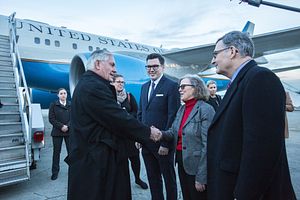The North Korean crisis has been significantly de-escalated in recent weeks. However, the world community seems to have split on the issue, with China and Russia on one side, and a grouping led by the United States and Canada on the other.
Canada and the United States are currently co-hosting the Vancouver Foreign Ministers’ Meeting on Security and Stability on the Korean Peninsula.
According to the Canadian government, besides U.S. Secretary State Rex Tillerson and his Canadian counterpart Chrystia Freeland, another 18 foreign ministers from across the world will “meet to demonstrate solidarity in opposition to North Korea’s dangerous and illegal actions” and “discuss ways to increase the effectiveness of the global sanctions regime in support of a rules-based international order.”
The other 18 participating countries are South Korea, Japan, Australia, Belgium, Colombia, Denmark, France, Greece, India, Italy, Netherlands, New Zealand, Norway, the Philippines, Sweden, Thailand, Turkey, and the United Kingdom.
It’s worth mentioning that most of these participating states had joined the Korean War to aid South Korea under the auspices of the United Nations, with the United States as the principal force.
“We believe a negotiated, diplomatic solution is both essential and possible, and we have consistently reiterated our support for a peaceful, diplomatic approach to North Korea. Canada will continue to work with its allies and regional partners in pursuing our common objective of a secure and stable Korean peninsula,” the Canadian government said.
However, it’s highly doubtful whether “a negotiated, diplomatic solution” can be reached without China and Russia. The two neighbors of North Korea and members of the Six Party Talks were not included in the Vancouver meeting.
Although Canada claimed that it did invite China, the U.S. State Department said the opposite — that China was intentionally not invited, since China “was not a part” of the United Nations Command Sending States, which supported South Korea during the Korean War.
Whether China and Russia were actually invited or not, both countries have been deeply irritated by this meeting.
China’s foreign ministry spokesman Lu Kang reportedly condemned the meeting harshly during a regular press briefing on January 10, but his comments in the transcript of the press briefing were deleted by the Chinese foreign ministry. According to Montreal Gazette, Lu said:
China will not attend such a meeting. Any meeting organized in the name of the so called “UN Command” reflects Cold War thinking, which will only create divisions in the international community and undermine the joint efforts that are being made to resolve properly the Korean Peninsula nuclear issue. From the very beginning, China considers the meeting meaningless and firmly opposes it.
Russia’s condemnation was more fierce. According to CBC News, Russia’s Foreign Minister Sergey Lavrov said straightforwardly on January 15 that “this meeting is harmful.”
“When we found out about this meeting, we asked: ‘Why do you need all those countries together? Greece, Belgium, Colombia, Luxembourg. What do they have to do with the Korean peninsula today?”‘ Lavrov added.
In an attempt to counter the Vancouver meeting, Russia and China also held a special meeting on the North Korean issue.
According to Chinese foreign ministry, Russia’s Deputy Foreign Minister Igor Morgulov and Chinese Assistant Foreign Minister Kong Xuanyou — who also holds the position of China’s special representative on Korean peninsula affairs — met in Moscow on January 13. At the meeting, both sides agreed to strengthen cooperation to ease tensions on the Korean Peninsula and find a solution to the whole range of problems on the basis of jointly drafted peace initiatives.
As The Diplomat has been closely following, recently both Koreas have been moving quickly toward an unexpected rapprochement since North Korean Supreme Leader Kim Jong-un offered a rare olive branch in his New Year’s speech. On January 9, the first round of official dialogue between the two Koreas was held in the border village of Panmunjom. Both sides agreed that North Korean will send a delegation to the 2018 PyeongChang Winter Olympics.

































